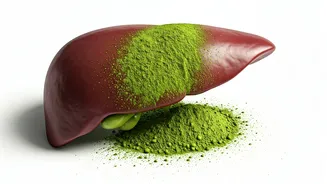Matcha's Growing Popularity
Matcha has gained popularity as a health drink. However, understanding its impact on the body is crucial. Matcha, a finely ground powder of green tea leaves,
is rich in antioxidants and offers various health benefits. Many individuals integrate matcha into their daily diet for its energy-boosting effects and potential health advantages. But, like all foods, consuming it in large quantities can have unexpected consequences. It's essential to recognize both the pros and cons to maintain a healthy lifestyle.
Liver Strain from Matcha
Overconsumption of matcha can strain the liver. The liver is vital for detoxifying the body. When one consumes excessive amounts of matcha, the liver has to work extra hard to process the high levels of specific compounds. This increased workload can lead to liver stress. Matcha contains compounds like catechins, which, when ingested in excessive quantities, have been linked to liver problems in some individuals. Moderation is key to avoiding this potential adverse effect. It is important to know that individual reactions to matcha can vary, and it is best to consult with a healthcare professional regarding any specific concerns.
Matcha's Heart Implications
The effects of matcha on the heart warrant consideration. While matcha offers antioxidants, its caffeine content may pose challenges for heart health, especially with high intake. Excessive caffeine can lead to increased heart rate and blood pressure, potentially causing stress on the cardiovascular system. People sensitive to caffeine might experience palpitations or other heart-related symptoms after consuming too much matcha. Monitoring your body's response to matcha and limiting intake is key to heart health. It is always wise to seek medical guidance if there is any history of heart issues.
Nutrient Level Impact
Matcha's impact on nutrient levels is an additional consideration. The high antioxidant content in matcha is often seen as beneficial. However, some studies propose that in excess, these antioxidants can interfere with the body's absorption of some essential nutrients, like iron. This interference can reduce the effectiveness of nutrient uptake, potentially leading to deficiencies over time. It is crucial to maintain a balanced intake of matcha and a well-rounded diet to ensure the proper absorption and utilization of essential nutrients. Careful planning and monitoring are essential to achieve optimal health outcomes.
Moderation and Balance
Balancing matcha intake is key to enjoying its benefits without risking health issues. Moderation plays a central role in any healthy dietary approach. Recognizing personal limits is vital. Start with small servings of matcha and assess how your body reacts before increasing the amount. Considering the caffeine sensitivity and liver function is important for personal assessment. Maintaining a balanced intake involves combining matcha with a diverse diet that contains a variety of nutrients to prevent any negative nutrient-related impacts. Consulting a healthcare provider can also help tailor your matcha consumption to your health needs.














